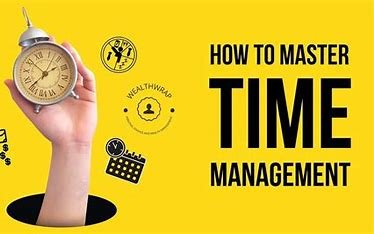Mastering time management in a busy world is essential to achieving personal and professional success while maintaining balance and well-being.

1. Prioritize Tasks:
- Identify Priorities: Determine which tasks are most important and prioritize them. Use techniques like the Eisenhower Matrix to classify tasks as urgent and important, important but not urgent, urgent but not important, or neither.
- Focus on High-Impact Activities: Concentrate on tasks that have the most significant impact on your goals and well-being.
2. Set Clear Goals:
- SMART Goals: Set Specific, Measurable, Achievable, Relevant, and Time-bound goals. Clear goals provide direction and motivation.
- Break Down Goals: Divide larger goals into smaller, manageable tasks to make them less overwhelming and more achievable.
3. Plan Your Day:
- Daily Planning: Take a few minutes each morning or the night before to plan your day. Use a planner, digital calendar, or to-do list to organize tasks and allocate time for each.
- Time Blocking: Schedule specific blocks of time for different activities. This helps ensure you allocate sufficient time for important tasks and avoid multitasking.
4. Minimize Distractions:
- Identify Distractions: Recognize what distracts you the most, whether it’s social media, emails, or noise, and take steps to minimize these distractions.
- Create a Focused Environment: Set up a workspace that minimizes interruptions and promotes concentration. Consider using tools like website blockers or noise-canceling headphones.
5. Practice the Pomodoro Technique:
- Work in Intervals: Use the Pomodoro Technique, which involves working for a focused 25-minute period followed by a 5-minute break. After four intervals, take a longer break. This method can enhance focus and prevent burnout.
6. Delegate and Outsource:
- Identify Tasks to Delegate: Determine which tasks can be delegated to others or outsourced. Delegating frees up time for higher-priority activities.
- Trust and Communicate: Clearly communicate expectations and provide necessary resources to those you’re delegating tasks to, and trust them to complete the work.
7. Learn to Say No:
- Set Boundaries: Politely decline tasks or commitments that don’t align with your priorities or that you don’t have the capacity to handle. Setting boundaries helps protect your time and energy.
- Evaluate Requests: Consider whether a new task or commitment will add value to your goals before agreeing to it.
8. Take Care of Yourself:
- Self-Care: Prioritize self-care activities like exercise, relaxation, and sleep. Taking care of your physical and mental health enhances productivity and focus.
- Regular Breaks: Take regular breaks throughout the day to recharge. Short breaks can improve concentration and prevent fatigue.
9. Reflect and Adjust:
- Review Your Progress: Regularly review your progress and evaluate how effectively you’re managing your time. Identify areas for improvement and adjust your strategies accordingly.
- Celebrate Achievements: Acknowledge and celebrate your accomplishments, no matter how small. Positive reinforcement boosts motivation and morale.
